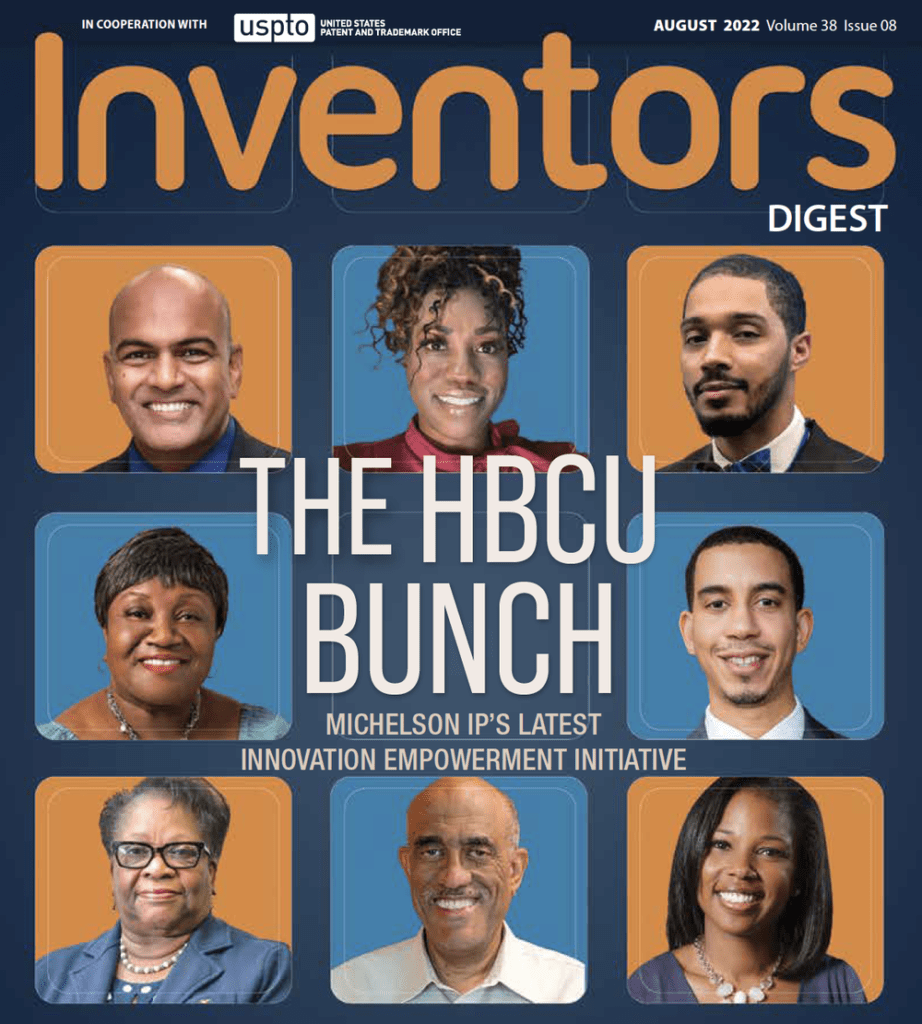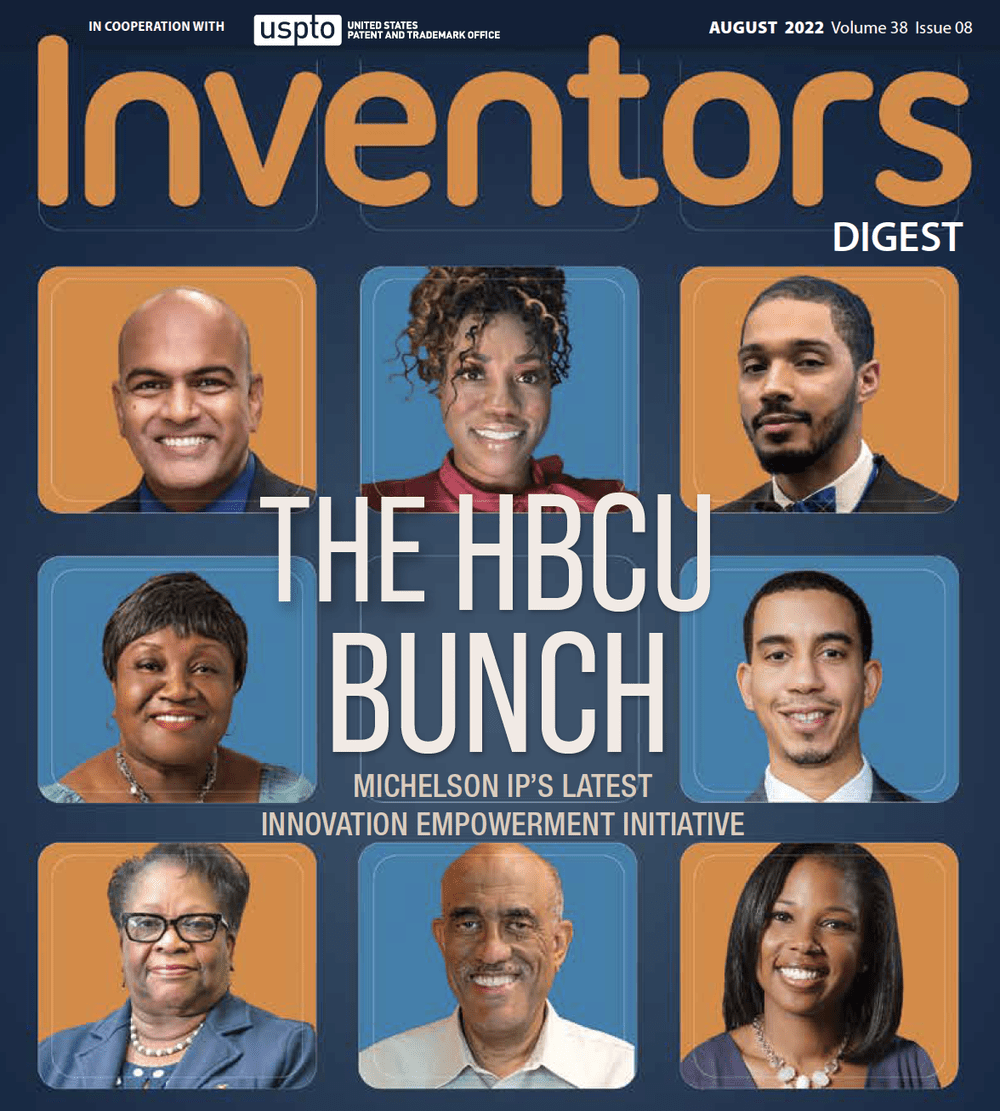This article was featured as the August 2022 cover story in Inventors Digest Magazine. Click here to view the full magazine cover and story.
By Justin Chapman (Originally published on michelsonip.com)
A South Carolina State University student created a way to make meal preparation faster, and he applied for a patent. A student at Xavier University in Louisiana is developing a line of skincare products and plans to trademark her logo. Intellectual property—including patents, copyrights, and trademarks—is a competitive advantage in today’s economy. Yet most students aren’t exposed to these tools.
Underrepresented entrepreneurs face even more overwhelming, systemic barriers. Consider that a Michigan State University study found between 1976 and 2008, African-American inventors were awarded six patents per 1 million people, compared to 235 patents per 1 million for all U.S. inventors. Statistics like those are why the Michelson Institute for Intellectual Property (Michelson IP) launched the HBCU IP Futures Collaborative—a faculty-led community of practice aimed at evangelizing IP education to fellow campus educators, creators, innovators, and entrepreneurs.
Michelson IP’s HBCU Mission
“We need to do something to make sure we recruit women and people of color, and try to have some equity,” said Dr. Gary K. Michelson, founder of the Michelson 20MM Foundation, which oversees Michelson IP. IP education has “lit a fire under the students,” said Dr. Jerald Dumas, dean of the Graduate College and chair of the Chemical Engineering Department at Hampton University in Virginia.
As part of the program, Michelson IP provided digital curricula, resources, videos, textbooks, and $25,000 grants to the seven HBCUs that joined the program: Bethune Cookman University, Morehouse College, Norfolk State University, Tuskegee University, Hampton, South Carolina State, and Xavier.
“Our nation’s HBCUs are a wellspring of creativity and ingenuity,” Michelson said. “The collaborative will further uplift these students in identifying and securing their valuable IP for the benefit of generations to come.”
Michelson IP also produced the textbook “The Intangible Advantage: Understanding Intellectual Property in the New Economy” to provide free IP education to students. It addresses patents, trademarks, copyright, and trade secrets. It is available as a digital textbook called “Introduction to Intellectual Property” through OpenStax, the leading publisher of free, open educational resource textbooks. More than 23,000 students worldwide have taken the Michelson IP course, a free resource hosted on the Udemy e-learning platform. Nearly 400 institutions have embedded Michelson IP’s curriculum and resources into the classroom.
A Burning Hunger for Intellectual Property Education
Dr. Muhsinah Morris, director of Morehouse in the Metaverse, said there’s a hunger among young people for IP education. They know it is a key to their success.
“I had students actually reading the book [“The Intangible Advantage”]. They won’t read the chemistry books that they paid for,” Morris said.
“I had a student before Day 1 say, ‘I’m already through Chapter 3. I was just so curious, and I couldn’t stop reading. I went through the PowerPoints and videos, too.’ And to be frank, it’s not like he was the best student I’ve ever had. That’s the enthusiasm that I want to see. The fact that he had this exploratory curiosity that was being forged and nurtured was really exciting.”
Dumas is also co-principal investigator of Hampton’s Innovation Corps (I-Corps) Site. I-Corps Sites are National Science Foundation-funded organizations that provide infrastructure, advice, resources, networking opportunities, training, and funding to entrepreneurs to transition their concepts into the marketplace.
“In Phase 2, we want to engage the students even more, bring in more guest speakers, and actually have students go through mock invention disclosure applications.”
—Dr. Jerald Dumas, Hampton University
“The Michelson IP education is synergistic with I-Corps activities, where students can learn about customer discovery and support their business ideas,” he said. “With the Michelson funding, I could introduce them to protecting their intellectual property and learning the differences between trademarks and other types of mechanisms to protect such property.”
Two chemical engineering students served as campus ambassadors, produced PowerPoints, and made presentations to groups across campus—including to the student chapters of the American Institute of Chemical Engineers and the Society of Women Engineers. Dumas plans to follow up with those chapters to help them with any patent applications. The program completed Phase 1 in the spring semester; it introduced the students and faculty to IP education. Phase 2 will help students take the next step of developing their ideas to filing patent and trademark applications.
“In Phase 2, we want to engage the students even more, bring in more guest speakers, and actually have students go through mock invention disclosure applications,” Dumas said. “Phase 2 will be more hands-on.”
Incubating ideas on HBCU Campuses
Some students aren’t waiting. The South Carolina State engineering student who created the aforementioned fast-food invention that makes meal preparation even quicker has applied for a patent with funding from the IP Futures Collaborative. His application is under review. Other students are developing their own ideas.
“We’re trying to get students to think about coming up with ideas of things that they can do to start a business and innovative things,” said Dr. Barbara Adams, dean of the College of Business at South Carolina State.
Dr. Mark Quinn of Xavier, the Conrad Hilton endowed chair of entrepreneurship, launched a business incubator called the X-ncubator for students looking to start their own business.
“I am working with one student in the incubator who’s developing a line of skincare products,” he said. “Her intent is that she will actually trademark her logo, and we will help her with that.”
The importance of IP education is twofold: It helps students realize the value of their own talents and creativity, and it keeps them from inadvertently infringing on other people’s IP.
Mass Communications major and Entrepreneurship minor student Hannah Shareef served as an IP ambassador on campus and developed a marketing campaign about IP. They coined the term “IP is Dope,” which they printed on bottles and T-shirts. Shareef installed pop-up tables around campus and handed out the swag. This enabled them to quickly build their email list, gain followers on Twitter, and get the word out about IP education. Quinn said the videos about patenting, trademarking, and copyrighting are what really resonated with students.
“Those hit the sweet spot with students in terms of taking what could be extremely complex topics and delivering the content in a very engaging and understanding manner,” he said.
He’s hearing from students that they are learning new things. One student in his Intro to Entrepreneurship class, Jana Ewing, said the videos were “helpful, easy to understand, broke down everything, and expanded my prior knowledge.”
IP Education Promotion and Collaboration
Quinn said the importance of IP education is twofold: It helps students realize the value of their own talents and creativity, and it keeps them from inadvertently infringing on other people’s IP. Morris said there are some definite gaps in understanding IP protocols.
“Most students understand patents, but they don’t understand anything else,” she said. “They know that patents and copyrights exist, they just don’t know how, why, the ins and outs.”
Devin Smith, a student in Dr. Vickie Cox Edmondson’s Business Policy Capstone class at Tuskegee, has been creating original work for a while but had little knowledge of intellectual property and copyright laws.
“When I find the opportunity to get all my work patented and copyrighted, it will eventually give me the space and foundation to create more and display the work publicly,” Smith said.
Dr. Cox Edmondson is a good example for her students: She successfully filed for a trademark in March 2022 for her book, “Thinking Strategist,” which provides readers with additional resources. Dumas said IP education should be taught to all students.
“Every school across campus could definitely benefit from this content,” he said. “Many of our students leave as entrepreneurs with their own side projects they worked on outside of Hampton.”
“Like how we’ve been pushing for financial education, this is another type of education that helps prepare our students for entrepreneurship, making sure they are protected and understand their own rights in this world.”
—Dr. Muhsinah Morris, Morehouse College
Dr. Michelson has advocated for teaching IP literacy as early as first grade. Adams agreed that it’s a good idea to introduce IP education at an early stage. Morris went even further, adding that IP education should start in kindergarten.
“It should be almost like how we’ve been pushing for financial education,” she said. “This is another type of education that helps prepare our students for entrepreneurship, making sure they are protected and understand their own rights in this world.”
In addition to the HBCU IP Futures Collaborative, Michelson IP also partnered with the National Association for Community College Entrepreneurship to launch teaching guides for community colleges. Adams wants to develop an actual course in IP that students across campus will be able to take.
Morris summarized: “In the long run, I want to have a co-curricular, student-led program where we have people in all disciplines come out and talk about IP—attorneys, patent agents, the USPTO.”
“I’d like to gather the entire institution and have a discussion about IP and what that looks like in your discipline. Everybody needs this.”


